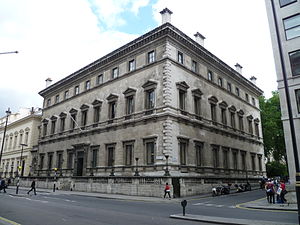The Reform Club
| Reform Club | |
|---|---|

Reform Club viewed from Pall Mall, adjacent to the Travellers Club
|
|
| General information | |
| Architectural style | Italian Renaissance |
| Address |
Pall Mall London, SW1 |
| Coordinates | 51°30′24″N 0°08′01″W / 51.506785°N 0.133625°W |
| Groundbreaking | 1837 |
| Completed | 1841 |
| Landlord | Crown Estate Commissioners |
| Design and construction | |
| Architect | Sir Charles Barry |
| Civil engineer | Thomas Grissell & Morton Peto |
| Main contractor | Grissell & Peto |
| Website | |
| www |
|
The Reform Club is a private members club on the south side of Pall Mall in central London. As with all London's original gentlemen’s clubs, it comprised an all-male membership for decades, but was the first to change its rules to include the admission of women on equal terms in 1981. Since its founding, the Reform Club has been the traditional home for those committed to progressive political ideas, with its membership initially consisting of Radicals and Whigs. However, today it is no longer associated with any particular political party, and now serves a purely social function. And today's Reformers are men and women drawn from many backgrounds and a wide field of professional life.
"The Reform" (as it is known in common parlance) currently enjoys extensive reciprocity with similar clubs around the world; and attracts a significant number of foreign members, such as diplomats accredited to the Court of St. James's. Of the current membership of around 2700, some 500 are overseas members, and over 400 are women.
The club was founded in 1836 by Edward Ellice, Member of Parliament (MP) for Coventry and Whig Whip, whose riches came from the Hudson's Bay Company but whose zeal was chiefly devoted to securing the passage of the Reform Act 1832. This new club, for members of both Houses of Parliament, was intended to be a forum for the radical ideas which the First Reform Bill represented: a bastion of liberal and progressive thought that became closely associated with the Liberal Party, who largely succeeded the Whigs in the second half of the 19th century.
...
Wikipedia
